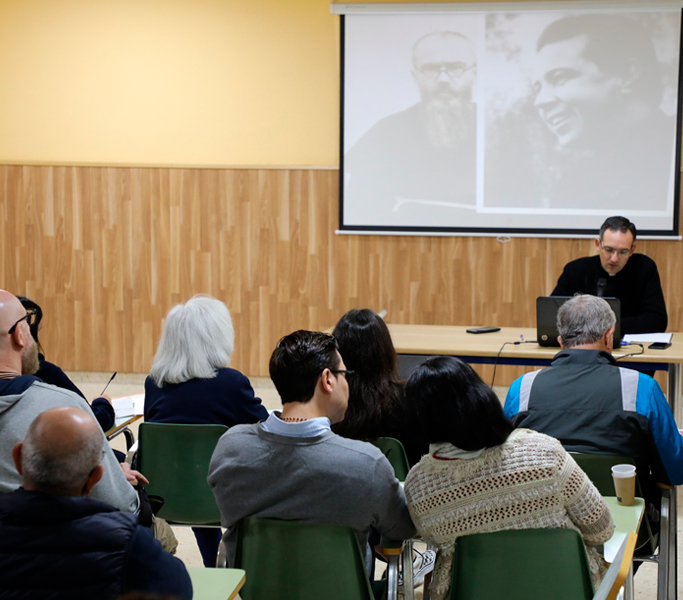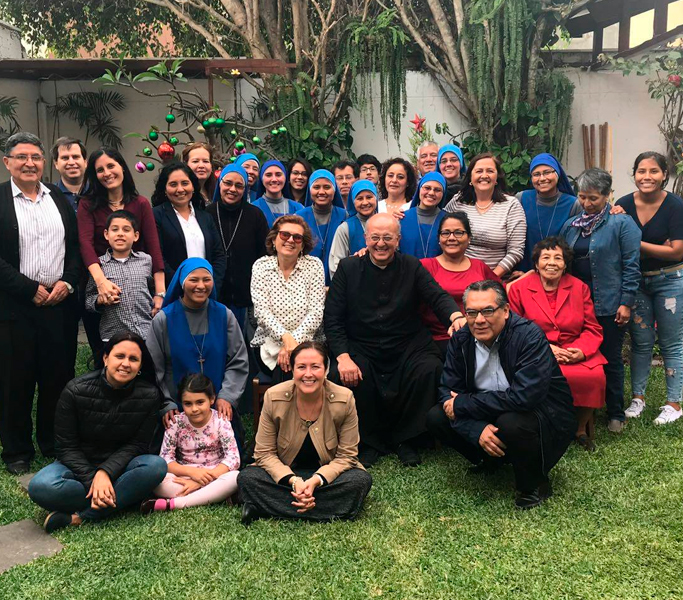Like the first Christians, who distinguished themselves by mutual love, the tertiaries of the Incarnate Word must stand out for living fraternal charity.
To live fraternal charity is an imperative of the Incarnate Word, He was the one who elevated fraternal love to a sublime degree when he left to men the commandment of love as a testament, A new commandment I give to you, that you love one another; even as I have loved you (Jn 13:34); This is my commandment, that you love one another as I have loved you (Jn 15:12).
A commandment that is proper and unique to the Christian, in which all tertiaries must be distinguished; it is at this point that the identity as a member of the Third Order Secular of the Religious Family of the Incarnate Word is played, because only with the effective practice of charity can they be called disciples of the One who said: by this all men will know that you are my disciples, if you have love for one another (Jn 13:35).
Without charity we are nothing, we can build buildings, schools, schools, orphanages, we can even form large groups and movements, but if in these works lack the genuine spirit of Christian charity, all these would be vain and over time would end up collapsing like a house of cards, and they would not be worth anything: If I speak in the tongues of men and of angels, but have not love, I am a noisy gong or a clanging cymbal. And if I have prophetic powers, and understand all mysteries and all knowledge, and if I have all faith, so as to remove mountains, but have not love, I am nothing. If I give away all I have, and if I deliver my body to be burned, but have not love, I gain nothing (1 Cor 13:1-3), because charity is the life of the soul, and therefore we are dead if we are not led by the love of God, he who does not love remains in death (1 Jn 3:14). God is love, and he who abides in love abides in God, and God abides in him (1 Jn 4:16); let us love one another; for love is of God, and he who loves is born of God and knows God (1 Jn 4:7).
That is why we must strive to live the authentic charity, the charity that moved the Incarnation, the one that Our Lord manifested in his earthly life, the one that burned his breast with the same fire that he brought to this earth and of which he is anxious to begin to burn[1], charity that flows from the open side of the cross, where the greatest work of love that can be seen and will be seen in history was manifested. True charity that seeks the good of the other even at the cost of one’s own evil, which seeks that others are well before their own good, that tries to make others happy more than himself, that he has his eyes more on his neighbor, in whom contemplates the presence of God, than in personal comforts.
What are the characteristics of this spirit of charity? These are the ones St. Paul enumerates in a detailed way in his first Letter to the Corinthians. It is a spirit of understanding and kindness: love is patience and kind (1 Cor 13:4); it is patient, because for true love of God and neighbor it is able to tolerate the most unpleasant and difficult things, hence its strength and dominance: many waters cannot quench love, neither can floods drown it (Song 8:7). And it is kind because it tends to spill over to others, it is the spirit of charity that makes us generous with God and with our fellow human beings, aware that we should not keep the assets that we possess, that we earn more than we receive.
Love is not jealous (1 Cor 13:4), it avoids grudges and bad desires, never laments for the good of others, doesn’t suffering from the praises that are paid to others, it itself joins them. And far from envying with sorrow the success of the neighbor, it takes part of his joys just as it suffers with his pains. It could be said that the good of the neighbor is also his.
Love is not boastful, it is not inflated (1 Cor 13:4), it does not boast of merit more than it is really worth, it does not seek to show itself, it does not get puffed up because it knows that all swelling comes from pride, the cause and root of all sin.
Love is not arrogant (1 Cor 13:5); Courtesy, education and the correct and delicate treatment of our neighbors is one of the most authentic and unforgeable manifestations of authentic love. Courtesy is a beautiful Christian virtue that, for reasons of love, seeks to make human coexistence pleasant, when it unites words and acts of deference, attention, consideration, help, the inner feeling that those words or events express. “Let us use gentle charity in manners, but without being pedantic. We never refer to other things that we have heard in a reserved manner or tell the partner what has been said against him by another, because it would be to sow resentment and discord. Let us beware of uttering words that may hurt or displease, let us not lead to animosity, or reprimand in the presence of others if there is no just reason”[2].
Love is not rude (1Cor 13:5), it doesn’t scold, it does not seek to give so as to receive, it does not do good works just because it will be thanked; it has only one interest, the greatest honor and glory of God, and everything else looks for it in order of it.
Love is not irritable (1 Cor 13:5), because it does not lean towards anger, it does not try to take revenge, but it deeply loves even enemies, those who persecute us and harm us: the anger of man does not work the righteousness of God (James 1:20); it does not look for the shock without reason, nor does it fix itself only on the criticizable and the negative, putting aside the praiseworthy and the positive.
Love is not resentful (1 Cor 13:5), it interprets everything in a good way, saving, at least, the good intention or the inadvertence of the one who acts manifestly wrong, always prefers to be mistaken for excess of indulgence and kindness before a precipitated and rigorist judgment. “It may be that the one who interprets in the best sense is deceived more frequently: but it is better that one deceives oneself many times having a good opinion of some bad man, than the one who is deceived seldom, having a bad opinion of a good man, because for this reason it is insulting another and not the first”[3]. It does not judge anyone, for it knows that judgment does not belong to man over others, God having reserved it exclusively for himself[4]. That is why he does not make foolhardy or unfounded judgments but thinks with the truth, speaks with kindness and corrects with mercy. “No one should disregard or infer any other damage without a probative cause; and therefore, where there are no obvious signs of someone’s malice, we should consider him to be good interpreting in the best sense what is doubtful”[5]. Following the teaching of St. Ignatius: “it must be assumed that every good Christian must be more prompted to save the proposition of his neighbor than to condemn it; and if he cannot save it, he will inquire how he understands it, and if he misunderstands it, correct him with love, and if it is not enough, look for all the convenient means so that, well understanding it, he will be saved”[6].
Love does not rejoice at wrong (1 Cor 13:,6), because it presupposes justice as the basis of its actions.
Love rejoices in the right (1 Cor 13:6), love is not only intimately connected with the truth, but “delights in the truth”, because it knows that all truth comes from the Holy Spirit, that is why it is reluctant to duplicity, to falsehood and to error.
Love bears all things (1 Cor 13:7), because out of love it tries to excuse and disguise the defects of the neighbor rather than defame or slander him, because it suffers everything, and thus knows how to forgive from the heart, forget the injuries received, heal wounds and knows how to treat the guilty with the same cordiality as before committing his wrongdoing.
Love believes all things, hopes all things, endures all things (1 Cor 13:7), because those who are penetrated by fraternal charity admit or believe without difficulty the words of their neighbor, without this ease of believing their neighbor being incompatible with the most exquisite prudence; also awaits the best things of the neighbor; and even if it sees him doing wrong now, it does not despair of his amendment and salvation.
May that spirit of true love always burn in our chests and makes us spill and empty ourselves for the good of others, that we be instruments that fill the world with the spirit of love that Christ came to give us, that each tertiary can live what San Francisco de Assisi asked for:
“Lord, make me an instrument of your peace.
Where there is hatred, let me bring your love.
Where there is offense, let me bring you pardon.
Where there is discord, let me bring union.
Where there is error, let me bring truth.
Where there is doubt, let me bring faith.
Where there is despair, let me bring hope.
Where there is darkness, let me bring your light.
Where there is sadness, let me bring your joy.
O’ Master, let me not seek as much
to be consoled as to console,
to be understood as to understand,
to be loved as to love,
for it is in giving that one receives,
it is in self-forgetting that one finds,
it is in pardoning that o neis pardoned;
it is in dying that one is raised to eternal life”[7].
When in a community “the love of God reigns, then there is also love for brothers and love for one’s neighbor; where the love of God burns in our hearts, all human affections are purified and subjugated, all things of this world are considered ut stercora. There is nothing that is more kind to the Heart of Jesus Christ as one who loves and does good to others, especially to those closest to him; to the brothers in the faith, in the vocation and community, and to the souls. Then we love each other reciprocally, each one enjoys for the good of the other as for that of all: it becomes in Domino, one for all and all for one, and that community becomes a paradise. And fraternal charity intensifies love for God himself, and love for our brothers is like a vehicle of God’s love. And the path of fraternal charity is a very short and safe path to reach perfection and become saints”[8].
Fraternal love should be lived in such a way that when one looks at our lives it is said: “Look how they love each other and how they are willing to die for one another”[9], or as it was also said of the first Christians “they love each other even before knowing each other”[10]. We must have a firm purpose of always saving charity, even though there may be false brothers[11] who interfere to spy on the freedom we have in Christ Jesus, who seem to be with us but who are not of ours.
“Fraternal love is a precious treasure and we must try by all means to preserve it and increase it… See that self-love, which in itself is restless, suspicious, has a thousand susceptibilities: it alters the imagination, disturbs reason and is declared enemy of fraternal love. Let us be alert because where self-love reigns, charity cannot live. Let’s hold the tongue, hold the anger, bear it all. Let us think that we will never have to possess fraternal love, if we do not want to tolerate each other’s faults. We all have our faults and sins: he who is without sin be the first to throw stone first throw the stone… (Jn 8:7). And let us shake hands and walk together towards the Celestial Homeland. Let us build ourselves with reciprocal good example … let us love not in word or speech but in deed and truth (1 Jn 3:18)”[12].
“Let us love, then, in God and for God, our neighbor with ordered charity,… let us love ourselves with a patient and delicate love, with a pure and holy love, without sentimentality. Let’s love in the Lord. This pleases the Lord so much!”[13]
Charity must always appear, become visible, and become a human means of attraction and conquest.
In a particular way this should be shown in the love to those with whom it is more difficult for us to deal with, to those who are more unfriendly or more annoying, to our enemies and to those who hate and persecute us. “Charity gives us an invincible force against the devil and the world, and against the passions, against the inner enemies, but also makes us formidable and invincible against all our external enemies: we will overcome them by loving them, praying for them, with great humility, and offering, if necessary, our poor life to do them some good and save them”[14].
All tertiaries should look at the exemplary example of the love of Jesus Christ who loved us to the end (Jn 13:1), greatest love nobody has, than to give his life for his friends. Therefore, we should try to have the same sentiments as Our Lord, who was meek and humble of heart, who forgives seventy times seven and who will never put out the match that smokes. Of each tertiary one should be able to say what St. John Chrysostom said about Paul: “Paul’s heart is the heart of Christ”.
This is the spirit that must excel in all the activities of the different levels of our Third Order, fraternal charity must always reign, must reign in the movements, must reign in schools, in families, in parishes, in work, in studies, etc.
This spirit of charity manifests itself in a particular way with the so-called Oratory spirit [15], which should be sought to be lived by all the members of the Third Order in its three levels. In a particular way, this spirit must be verified in the movements and associations of the faithful, where through the communion of ideals and activities they must join forces to achieve the same ends, living Christian charity fully. Mainly this spirit should shine in the families, each family of each tertiary should try to be like a small Oratory where, under the authority of the parents, educate the children in the good and in the truth.
Let everyone try to create a climate of charity where the oratory is lived, an educational environment, of joy and healthy fun, open to all and encompassing everything, of freedom, of joy, peace and love in the Holy Spirit (Rom 14:17). Finally, let us encourage ourselves and repeat to ourselves the words that St. Paul wrote to the Corinthians: make love your aim (1 Cor 14:1).
Bibliography
[1] Cf. Lk 12:49.
[2] ST. LOUIS ORIONE, Letter to the Son of Divine Providence, 25 of July, 1936, 151.
[3] ST. THOMAS AQUINAS, Summa Theologica, II, II, q 60, 4 ad 1.
[4] Cf. Jam 4:12.
[5] Jam 4:12.
[6] ST. IGNATIUS OF LOYOLA, Spiritual Exercises, [12].
[7] ST. FRANCIS OF ASSISI, Simple Prayer.
[8] ST. LOUIS ORIONE, Letter to the Son of Divine Providence, July 25, 1936, 147.
[9] ST. BENIDICT, SR, XXXI, 19.
[10] MINUCIUS FELIX, Octavius, ML 3,289.
[11] Cf. 2 Cor 11:,26.
[12] ST. LOUIS ORIONE, Letter to the Sons of Providence, July 25, 1936, 151 and 152.
[13] ST. LOUIS ORIONE, Letter to the Sons of Providence, July 25, 1936.
[14] ST. LOUIS ORIONE, Letter to the Sons of Providence, July 25, 1936.
[15] Cf. Oratory Directory, 53ss.




